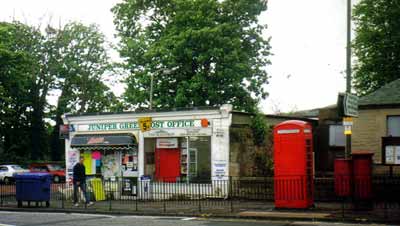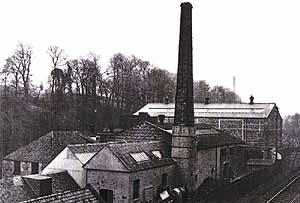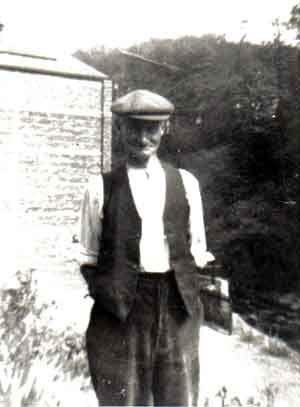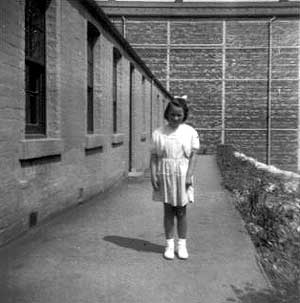Ann Gowans nee Notman : remembers the Woodhall Paper Mill
Interviewed by Cliff and Liz Beevers 5/2/07
(Ann lived at the mill but left the village when she was 14 in 1954, returned in the late 1970s and worked with Mrs Fisher and Mary Clark in the Juniper Green Post Office.)
On Woodhall Farm
David Webster, my grandfather had been grieve at Woodhall Mains for Duncan Campbell reporting once a week to the owner. He would get his orders for the next week. Miss Scott was the housekeeper there. Duncan Campbell was a lovely man. Miss Scott would take us for a ride in her pony and trap. There was my mother Janet, a sister Euphemia and a brother David (junior) in the Webster clan. My uncle David also worked on the farm and then served an apprenticeship as a blacksmith and farrier. He worked at Waddels in Colinton.
My mother and father married in 1938 and they had their wedding reception in the barn at Woodhall Mains. They lived in a room and kitchen at Leighsland (pronounced Leishland) which was where Iceland is today on Lanark road.
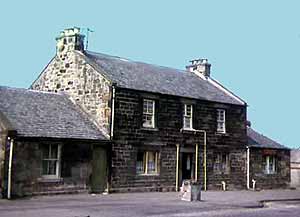
The building on Lanark Road pictured here in July 1970 occupying the place where Iceland stands in 2007
My father worked on the railway. My grandfathers on both sides worked on the land, they moved around a lot in those days. My grandfather Webster lived in the Woodhall farm cottages just before the farm on the way up from the bridge having crossed the river at Juniper Green, the far left cottage. Beyond that was the bothy. On the right as you turn the corner up to Woodhall Mains the first cottage was Lawson, then the Blairs and up the hill a little in a wooden house were the Youngs. I was often over at the farm, I was close to grandfather Webster. My mother Janet would go over and keep house for granddad (he would stay with us later). Davey was 92 when he died, he would have moved from Woodhall in the forties.
Woodhall Paper mill
Preparing the raw materials
There were 2 men designated to cut the rags or jute bags on a thing like a circular saw, it had to rip them to shreds. The fibres were flying all around so you couldn't see anything at all. All they had was a tiny mask; they had nothing to protect their eyes.
Sometimes banana wrappings would come in and we would rake through them since possibly you would still find a banana amongst them. Just after the War that was a prize worth having. The bananas weren't sent in boxes in those days, they were wrapped in a kind of straw.
Work Processes and workmen
Looking at the mill photo the big shed at the back is where they would store the paper; in the foreground there was a howf where the men had a cup of tea.There's a boiler house where they would stoke the fire. At the extreme west were the cottages where we lived. My step father, Joe Logg, was a beaterman in the mill and then after he had heart problems he worked at the weighbridge near to the station. A beaterman worked at one of the vats which by that time was all mechanical. The paper created was thick and I think it was used as wrapping paper for whisky bottles.
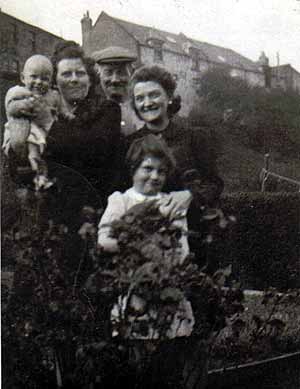
Ann's mother Janet holding Honor Logg as a baby, Davey Webster and Peggy Scott who was the mill foreman's wife. Jim Scott was the foreman at the mill.
At the mill it used to be a 12 hour shift system and then they went onto an 8 hour shift system. Some of the workers were:
- George and Jim McCrow: owners;
- Jim Scott, foreman;
- Bert Clacey, under manager;
- Mr Cochrane;
- Charlie Cochrane, worked in the office;
- David Webster, general handyman and gardener, Ann's grandfather;
- Jack Johnstone;
- Joe Brunston;
- Sticky Wood;
- Tucker Cavanagh (he was the stoker);
- William Corse;
- Mr Jackson, a local man who would cut up the rags;
- Davey MacDonald;
- Jack Mulroy, lived at the back of the village;
- Albert Woods, only there for a short time;
- Tom Glen;
- Jimmy Kay; and
- Mr Loudon.
Mill cottages
In later life my grandfather Webster joined the mill as gardener/handyman. He kept a beautiful garden all along from the station to the mill; he used cinders from the railway for his paths. He built a dry stone wall dyke to protect his garden and give it some good shelter. With it, he used to keep us going with vegetables through the winter. He would sell berries to the villagers, blackberries and the like.When he flitted to the mill house he had running water and a bathroom for the first time! Mr McCrow had the stable converted to give granddad a sitting room.
We used the track known as the mill lane down to our house. It goes down now beside the fish shop. It was a good track with cinders on it but I was a bit nervous going down it on my own at night.
Honor, my sister, fell in the mill lade and nearly drowned so Mr McCrow had it filled in and piped through. That was after the mill changed to electricity.
Mill day out was a big day in the village, all the family would go, children would get the day off school. If you were unmarried you could bring a relative. It would be to Largs, Dunoon or Perth. A bus would be hired for the day, you would stop for coffee, just like a tour, you would have your meal and stop again for tea. Your mother would have to go up to the school and ask if it was ok, just to be polite, it was never refused.
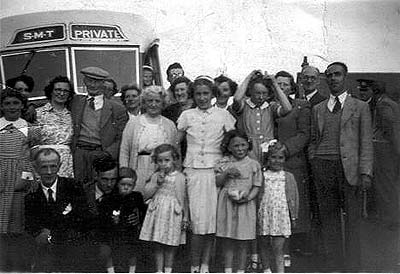
All ages would go on the Woodhall mill day out. Ann is on the extreme left in a dress hand-sewn by her mother
At the dooking hole we girls would watch the boys swim. It was just along from the station near the waterfall. Girls didn't swim: we just waited for them to come out as they were in the nuddy! They got freezing waiting for us to go away!
The mill was sold
Mr Jim and Mr George McCrow were the owners of the mill; Jim died very suddenly of a heart attack and soon after that George sold the mill. They say the deal was done on the day of the mill trip. The mill was sold to Inveresk in 1954 and within a month we had to move from our mill cottage into town: quite traumatic. Our cottage was at the level of the mill.
We had lived down by the mill with ducks around and it was like an ice palace in the winter then suddenly we were in town. There was all the security of living in a village, where everyone looked out for everyone else and then we were in the city in St Leonard's area. If granddad hadn't managed to save a little money we would have been out on the street. When we left the cottages they soon pulled them down.
A wartime memory
I have one memory of my father, who was killed in 1942. He was on the Russian convoys. We were in the kitchen at Woodhall and he was throwing me in the air and my mother shouted "Watch out, Tam, you'll drop her" and he said "Oh no I won't". He was in his uniform. It was a telegram boy that notified my dad's death. I think it was a black edged telegram. My aunt kept the last letter he sent, it was in pencil, and she gave it to me later in life. There was somewhat of an estrangement after my mother re-married, it was different times then, different ways of thinking. I only got my father's last letter when my step father died.
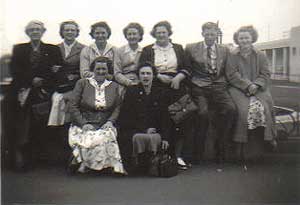
The Guild outing: the women look older in those days through all the hard work and the way they dressed.
Juniper Green school 1945 to 1951
The school had quite small classes. Two of my quali class went to Boroughmuir. One girl went onto Watson's and a boy won a scholarship for Heriot's. I had Miss Mulholland in the Infant School. She wore a smock to her knees for work with pockets in it. Then, I had Miss Spanswick who was quite strict. Miss Steel ruled with a rod of iron. Miss Spalding was head teacher and she and Miss Steel would go off for weekends together. Danny Ward, a taxi driver would come and pick them up and smoke in the school corridors while he waited for them. Miss Mulholland would collect Victorian pennies for a charity: she would swap you one for a newer penny.
I got sewing classes at school and I made a dirndl skirt with elastic waist, it took all year to make. There was a sewing teacher and an art teacher who came into the school. Both activities were upstairs but for classes it was downstairs. We didn't get cookery.
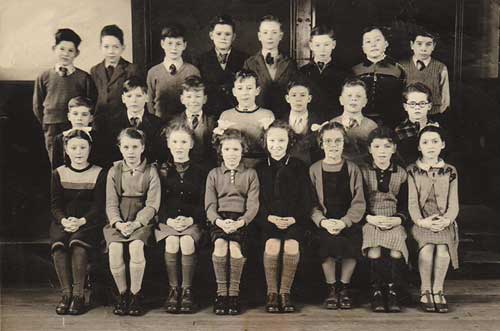
Class of 1947/8
Left to right back row: Alistair Buchan, Derek McKee, David Cormack, Gordon Walker, David Urquhart, George McCulloch, Jim Brown;
Next row: John Kermack, Harry Napier, Jim Stenhouse, Jim Michie, George Maxwell, Hugh Heritage, George Henderson;
Front row: Chrissie Todd, Jane Kermack, Jean Smith, Joan Cormack, Thelma Russell, Margaret Inglis, Ann Notman, Jean Fraser.
Shopping
My mother would go into town every Friday to buy fruit and fish. She would take the bus. Otherwise, she would shop at the store (St Cuthbert's). Miss Cattanach had her own shop. She had lots of packages in drawers and one day when the drawer was opened, out jumped a cat! The shop to the left of Cattanach's became a fish shop later.
The posh people would shop at Scott's at the corner of Baberton Avenue and Lanark Road and next to it was Willie Forsyth's the fruiterer. Willie married late in life and he passed away soon after the wedding and folk would say nudge, nudge, wink, wink "He couldn't handle it" but I didn't understand what they meant.
Good times
I remember the end of the War with the celebrations at Blinkbonny. At the top of the steps there, they danced, sang and had a drink.
Characters
Miss Todd at St Margaret's ran the Sunshine club on a Tuesday night for girls of primary age. We did singing and sewing. She died quite young; she was Chris Todd's aunt.
Mr Vass was an artist and he lived in the cottage opposite Scott's the butcher. He had a caravan made out of an old bus down at Belhaven.
Don't step on this leg until Thursday!
Professor Davidson lived in Woodhall House in the 1940s. He was posh: you would doff your cap to the professor. Granddad had been pulled under a plough and had broken his leg and it was Professor Davidson who had set it. He said to my granddad "Can you read?" And, when he said he could he wrote on his stookie "Don't step on this leg until Thursday".

